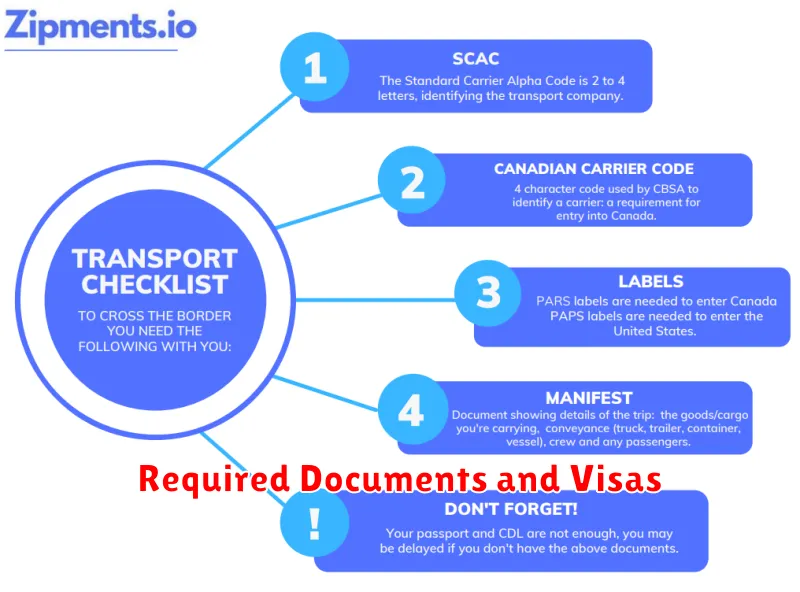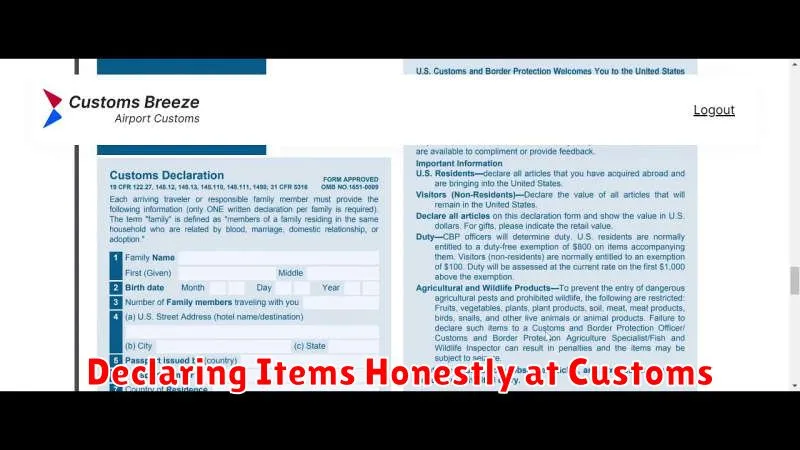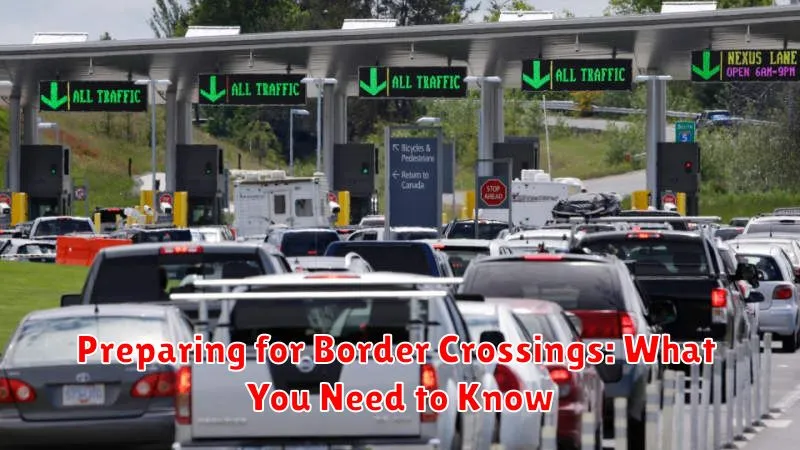Planning an international trip? Crossing international borders can be a complex process, and being unprepared can lead to significant delays and complications. This comprehensive guide will equip you with the essential information you need to navigate border crossings smoothly, whether you are traveling for business, pleasure, or any other purpose. We will cover the critical documents, visa requirements, customs regulations, and other vital aspects of border control procedures that will ensure your journey begins and ends without a hitch.
From understanding passport validity and obtaining the correct visas to navigating customs declarations and knowing your rights as a traveler, this article will provide valuable insights to help you prepare. We will delve into the specifics of different types of border crossings, including land borders, airports, and sea ports, highlighting the unique requirements for each. By understanding the rules and regulations beforehand, you can minimize stress and ensure a seamless border crossing experience. Prepare for your journey and avoid unnecessary hassles with our expert advice on preparing for border crossings.
Understand Border Policies in Advance
Border policies vary significantly between countries. Before you travel, research the specific entry and exit requirements of both your destination and any transit countries. Ignorance of these policies is not a valid excuse, and you could face penalties ranging from delays to denied entry.
Key aspects to research include visa requirements, customs regulations regarding permitted and prohibited items, and any specific health regulations or required vaccinations. Pay close attention to restrictions on items like food, alcohol, medications, and currency.
It’s crucial to understand duty-free allowances to avoid unexpected fees or confiscation of goods. Check for any recent changes to border policies, as they can be subject to updates due to security concerns or evolving international agreements.
Ensure your passport is valid for at least six months beyond your intended stay, and that you have sufficient blank pages for entry and exit stamps. Be prepared to answer questions from border officials regarding your travel plans, purpose of visit, and intended length of stay.
Required Documents and Visas

Border crossings necessitate specific documentation. Passports are generally required for international travel and should have sufficient validity remaining. Check your destination country’s requirements regarding passport expiration dates. Some countries require six months of validity beyond your intended stay.
Visas may also be necessary depending on your nationality and destination. Research visa requirements well in advance of your trip. Some visas can be obtained upon arrival, while others require an application process through the destination country’s embassy or consulate. Ensure you have the correct visa type for your intended purpose of travel, whether it be tourism, business, or study.
Additional documentation might include proof of onward travel, such as a return ticket or itinerary, and proof of sufficient funds to support your stay. Carrying copies of important documents, separate from the originals, is highly recommended.
Declaring Items Honestly at Customs

Declaring items at customs is a critical part of international travel. Honesty is paramount to ensure a smooth and legal border crossing. Failure to declare items accurately can result in penalties, including fines, confiscation of goods, and even legal repercussions.
When approaching customs, you will be required to complete a declaration form. This form typically asks for details about your trip, including your destination and the items you are bringing with you. Be prepared to provide accurate and complete information about all goods in your possession, including purchases made abroad, gifts, and even food items.
Certain items are subject to restrictions and may require special permits or documentation. These can include agricultural products, firearms, and certain types of electronics. Check with the customs authorities of both your departure and arrival countries for specific regulations before your trip.
If you are unsure about whether or not to declare an item, the safest course of action is always to declare it. Customs officials are available to answer your questions and guide you through the process. By being upfront and honest, you contribute to a more efficient and secure border crossing experience for everyone.
Handling Language and Cultural Differences
Crossing borders often means encountering different languages and cultural norms. Communication can be a significant hurdle. Consider learning basic phrases in the local language or utilizing translation apps. Even a few words like “please” and “thank you” can go a long way in demonstrating respect.
Cultural sensitivity is equally crucial. Research the customs and traditions of your destination. Be mindful of dress codes, social etiquette, and appropriate behavior in public spaces. Gestures and body language can have different meanings across cultures, so be observant and avoid actions that might be considered offensive.
Differences in dining customs should also be noted. From utensil usage to acceptable table conversation, understanding local practices can prevent unintentional faux pas. Similarly, be aware of local tipping customs, as they can vary significantly.
Remember, demonstrating respect for local customs and attempting to communicate, even with limited language skills, fosters positive interactions and enriches the travel experience.
How to Stay Calm During Inspections
Inspections are a standard part of crossing international borders. While they can be stressful, remaining calm and composed throughout the process is crucial. Cooperation with officials is key. Answer their questions truthfully and concisely, providing any requested documentation promptly.
Prepare all necessary documents in advance to avoid unnecessary delays and anxiety. Having your passport, visa, and other required paperwork readily available will streamline the process. Organize them neatly in a travel wallet or folder for easy access.
Understand that inspections are conducted to ensure safety and security. While they can be inconvenient, try to view them from this perspective. Avoid arguing with officials. If you believe you have been treated unfairly, address your concerns through the proper channels after the inspection.
Taking deep breaths can help manage anxiety. Focus on your breathing to help stay grounded during the inspection. Remember that most inspections are routine and completed without issue.
Insurance for Unexpected Delays
Border crossings, even with meticulous planning, can be unpredictable. Unexpected delays can arise from various factors, including increased traffic volume, heightened security screenings, or unforeseen circumstances like severe weather. These delays can lead to missed connections, accommodation expenses, and other unforeseen costs. Travel insurance can offer crucial financial protection in such situations.
When selecting travel insurance for border crossings, consider policies that specifically cover trip interruption and trip delay. Trip interruption coverage can help reimburse non-refundable expenses like flights or accommodations if your journey is significantly delayed or canceled due to issues at the border. Trip delay coverage can help cover expenses incurred during the delay itself, such as meals and lodging.
Carefully review the policy details to understand the specific coverage amounts, qualifying reasons for delays, and any documentation required to file a claim. Some policies might require specific documentation related to the border crossing delay, so it’s crucial to retain all relevant paperwork.
Tips for Land, Air, and Sea Borders
Crossing a border, regardless of whether it’s by land, air, or sea, requires preparation. Valid documentation is crucial. Ensure your passport has at least six months validity remaining and any necessary visas are secured in advance.
For land crossings, be prepared for potential delays. Have snacks, water, and entertainment on hand, especially if traveling with children. Familiarize yourself with the specific border crossing’s hours of operation.
Air travel often necessitates arriving at the airport several hours early. Confirm check-in procedures and baggage allowances with your airline. Have your boarding pass and passport readily available.
Sea border crossings, such as cruises or ferries, require similar preparation to air travel. Be aware of embarkation and disembarkation procedures. Carry any necessary customs forms and be prepared for potential security screenings.
Regardless of how you cross a border, always be respectful of local customs and regulations. Declare any goods as required and be prepared to answer questions from border officials truthfully and concisely.

